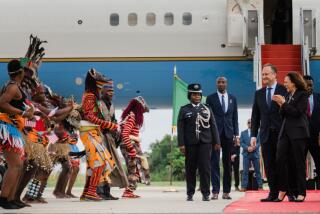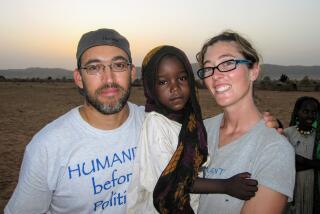Bringing Higher Learning to Africa
- Share via
While Peace Corps volunteer Trevor Murphy lectured about the laws of supply and demand at an all-girls school in Tanzania, his students’ attention often drifted elsewhere.
They gazed out their classroom window at Mt. Kilimanjaro, just hiking distance from the school. In a country where girls are expected to become homemakers, scaling Kilimanjaro was as unlikely a dream as any.
But during September 1996, Murphy organized a trip for 23 students from the Weru Weru Secondary School to climb the highest mountain in Africa. In the end, it offered lessons in building self-esteem and accomplishing goals--and why Hillary Rodham Clinton is a household name.
Their adventure caught the attention of the White House, and during an Africa tour last March, the first lady and Chelsea Clinton visited the school to meet some of the students who made it to the top.
“They have so much potential, but no one’s ever told them that,” Murphy explained this week while home visiting his family in Laguna Beach. It was his first trip back since he joined the international relief effort in September 1995.
“I gave them the opportunity so that they can do it themselves. I trained them, but they did it.”
Murphy, 25, is already on his way back to the East African country. Many friends from his alma maters, Laguna Beach High School and UC Berkeley, work in real estate, investment banking or computer software. But Murphy said he wanted to choose something more rewarding.
To prepare for the Kilimanjaro trip, students had to endure Murphy’s boot camp-style training that included jogging, sprinting and push-ups. It took 3 1/2 days to reach the top and another day and a half to climb back down.
Murphy was told a week before their scheduled arrival that the Clintons wanted to visit. There was a problem: Some had never heard of Hillary Clinton.
But when the Clintons arrived, the school was ready. The students who learned about the first family peppered the Clintons with questions, Murphy said, and when the visit was almost over, they gathered in a semicircle to read a poem about their climb and how it “proved to others and to ourselves that African women are capable of doing anything if they just try and believe in themselves.”
More to Read
Sign up for Essential California
The most important California stories and recommendations in your inbox every morning.
You may occasionally receive promotional content from the Los Angeles Times.









